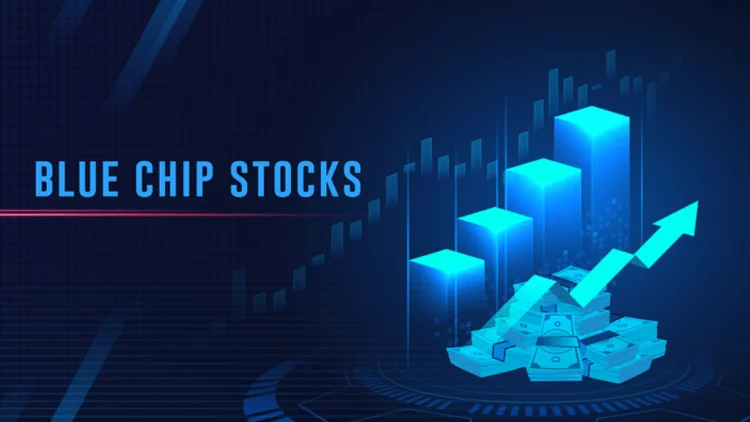Introduction: The Appeal of Blue-Chip Stocks in Uncertain Times
The stock market is notoriously volatile, with market conditions often shifting rapidly due to factors like economic uncertainty, geopolitical tensions, or unexpected financial crises. During periods of market turbulence, investors are naturally drawn to assets that offer stability and reliable returns. This is where blue-chip stocks typically come into play.
Blue-chip stocks are shares in well-established, financially stable companies with a long history of reliability, strong earnings, and consistent dividend payouts. These stocks tend to be leaders in their industries, have significant market capitalization, and are considered a safe haven during periods of economic instability.
But in today’s volatile market, characterized by global inflation, supply chain disruptions, and fluctuating interest rates, the question arises: Do blue-chip stocks still represent a safe and stable investment, or is it time to reconsider their role in your portfolio?
In this article, we will evaluate the current state of blue-chip stocks, analyze key factors that influence their performance during market turmoil, and offer insights into whether they remain a reliable investment choice for investors seeking stability.
Chapter 1: What Makes a Stock “Blue-Chip”?
Before diving into the analysis of whether blue-chip stocks are still a viable investment option, it’s important to understand what defines a blue-chip stock.
1.1 Characteristics of Blue-Chip Stocks:
- Market Leadership: Blue-chip stocks represent companies that are dominant players in their respective industries, whether it’s technology, consumer goods, healthcare, or financials. These companies often have strong brand recognition, a wide customer base, and a leading market share.
- Strong Financials: These companies are known for their consistent earnings, strong cash flow, and robust balance sheets, which allow them to weather economic downturns better than smaller, less established firms.
- Dividend Payments: Blue-chip stocks are generally known for offering reliable dividends, making them appealing to income-focused investors. These dividends are often seen as a sign of a company’s stability and commitment to returning value to shareholders.
- Reputation and Longevity: Blue-chip companies tend to have a long history of success, with many being household names that have been around for decades. Examples include companies like Apple, Microsoft, Johnson & Johnson, and Procter & Gamble.
Chapter 2: The Role of Blue-Chip Stocks in a Volatile Market
2.1 How Blue-Chip Stocks Perform During Market Turmoil
In times of market volatility, investors often turn to blue-chip stocks because of their reputation for being resilient. Here’s why these stocks are considered safer bets during turbulent times:
- Stability Amid Economic Shocks: Blue-chip stocks often belong to companies with diversified revenue streams, significant cash reserves, and solid management. This makes them better positioned to handle economic shocks or sudden market downturns. Even if their stock prices dip, they tend to recover faster than their smaller counterparts.
- Dividend Income: The consistent dividends paid by many blue-chip companies provide investors with steady income even during market dips. This is especially attractive during periods when other growth stocks may not be offering the same level of stability or payouts.
- Defensive Nature: Certain blue-chip sectors, such as consumer staples (e.g., Procter & Gamble) or utilities (e.g., Duke Energy), are considered defensive. These sectors perform relatively well even during economic slowdowns, as people still need basic products and services, regardless of the economic environment.
- Proven Track Record: Many blue-chip stocks have weathered previous financial crises, such as the 2008 Global Financial Crisis or the COVID-19 pandemic. Their ability to navigate through past volatility gives investors confidence that they will continue to perform well during future uncertainties.
2.2 Challenges for Blue-Chip Stocks in Today’s Market
However, the current market environment is far from typical, with challenges that could affect even the most resilient blue-chip stocks:
- Inflation: The persistent inflationary pressures in many countries can erode consumer purchasing power and increase operating costs. While many blue-chip companies have pricing power, they might still struggle with higher input costs or lower consumer demand for non-essential goods and services.
- Rising Interest Rates: Central banks worldwide have been raising interest rates to combat inflation. Higher rates increase borrowing costs for companies, which can negatively impact their profitability. Companies that rely heavily on debt financing, even blue-chip stocks, could see their margins squeezed in the face of rising borrowing costs.
- Supply Chain Disruptions: Ongoing global supply chain issues, particularly in industries like automotive, technology, and consumer goods, can hinder the ability of even blue-chip companies to meet demand, resulting in missed earnings projections and increased costs.
- Geopolitical Tensions: Ongoing geopolitical instability (e.g., tensions in Europe, trade wars, or conflicts in the Middle East) can disrupt markets and supply chains, leading to unpredictable swings in stock prices.

Chapter 3: Examining Specific Blue-Chip Sectors During Market Volatility
Certain blue-chip sectors may be better positioned to handle the current market environment than others. Let’s take a closer look at how specific industries are performing in light of the broader economic conditions.
3.1 Technology
The technology sector has long been a high-growth area, with companies like Apple, Microsoft, and NVIDIA considered blue-chip giants. However, the sector faces challenges in today’s volatile environment:
- Inflation and Higher Costs: Tech companies, especially those with hardware segments (e.g., Intel or Apple), face higher component prices and shipping delays.
- Interest Rates: Many technology companies rely on future earnings growth, and higher interest rates can reduce the present value of these future earnings. This could cause stock valuations to decline, particularly for high-growth tech stocks.
3.2 Consumer Staples
The consumer staples sector, which includes companies like Coca-Cola, Procter & Gamble, and Unilever, is considered one of the most defensive during market volatility. These companies sell essential products that consumers continue to buy, even in tough economic times.
- Resilience During Economic Downturns: As mentioned, consumer staples companies tend to be less sensitive to economic slowdowns because people still need to buy food, beverages, toiletries, and cleaning products, regardless of inflationary pressures.
- Inflation Hedge: Many blue-chip consumer staples companies have pricing power, which means they can pass on the increased costs to consumers without significantly affecting demand.
3.3 Financials
Banks and financial institutions like JPMorgan Chase and Goldman Sachs are also considered blue-chip stocks. However, the rising interest rates could benefit them in some ways:
- Higher Interest Rates: Higher rates can lead to better net interest margins for banks, as they charge more on loans. However, it could also lead to reduced loan demand and increased defaults if consumers and businesses struggle with debt repayment.
- Market Volatility: Financial stocks can be hit hard during periods of market uncertainty. Economic slowdowns or stock market corrections can lead to a reduction in trading volumes, investment losses, or lower consumer confidence.
3.4 Healthcare
Healthcare companies, particularly those that manufacture essential medical products or provide healthcare services (e.g., Johnson & Johnson, Pfizer), tend to be more resilient to market volatility.
- Steady Demand: Healthcare is a defensive sector because demand for healthcare services remains relatively steady, regardless of economic conditions. The aging population in many countries also ensures a growing market for healthcare services.
- Government Contracts and Recession Resilience: Many healthcare companies benefit from government contracts and have more predictable cash flows, making them attractive during times of economic uncertainty.
Chapter 4: Should Investors Still Bet on Blue-Chip Stocks During Market Volatility?
4.1 Advantages of Blue-Chip Stocks in Volatile Markets
- Stability and Reliability: Blue-chip stocks tend to be more stable and resilient compared to smaller, less-established companies.
- Dividends: Many blue-chip stocks offer reliable dividends, which provide a steady income stream even during market downturns.
- Proven Track Record: Blue-chip companies have survived past economic crises and have the resources to endure future volatility.
4.2 Risks and Considerations
- Slower Growth: While blue-chip stocks are more stable, they also tend to experience slower growth than smaller, high-risk stocks.
- Economic Sensitivity: Even the most established companies are not immune to global economic challenges, such as inflation, interest rates, and geopolitical risks.
- Higher Valuations: Some blue-chip stocks may be trading at elevated valuations, making them less attractive to investors seeking undervalued opportunities.
Conclusion: Are Blue-Chip Stocks Still a Safe Bet?
In the midst of ongoing market volatility, blue-chip stocks remain a solid choice for investors seeking stability, reliable dividends, and resilience. While there are certainly risks, especially in sectors like technology and financials, consumer staples, healthcare, and other defensive sectors are proving to be strong performers.
Investors who prioritize long-term growth and financial security may find that blue-chip stocks continue to offer an attractive option during turbulent times. However, it’s crucial to assess the individual characteristics of each company and sector to determine the best investment opportunities based on personal risk tolerance and market outlook.














































